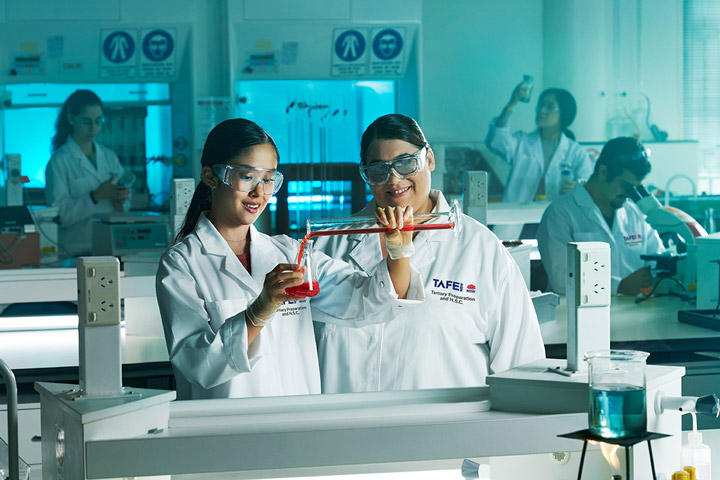- Go to homepage
- Course areas
- Laboratory Science
- Diploma of Laboratory Technology (Food)

OverviewAbout this course
Combine your passion for food with your interest in laboratory operations as you launch into the exciting world of food science. Gain the specialist skills to handle and analyse food samples using a range of testing equipment and report the results.
OutcomesWhat you'll gain
Learning outcomes
Through a mixture of theory and practical course work, learn to:
Follow work, health and safety (WHS) procedures including creating a food safety plan
Follow sustainability practices around food production, energy reduction and food packaging
Perform nutritional, allergen and sensory analysis tests on food samples
Monitor and analyse the quality of test results and data
Use laboratory application software
Maintain and calibrate instruments and equipment
Course outcomes
Gain practical experience and develop specialist skills that give you an advantage in the job market.
A nationally accredited diploma
Extensive practical experience working in a laboratory environment
The specialist skills to handle and analyse food samples using a range of testing equipment and report the results
The confidence and skills to work independently and as part of a team to perform a variety of laboratory tests and procedures
An understanding of the basic science behind food production
SuitabilityIs this course right for you?
Entry requirements
This course requires evidence of previous experience or study before you can enrol
Completion of the Certificate IV in Laboratory Techniques as evidenced by a copy of your transcript or certificate, or
Completion of the Certificate IV in Food Science and Technology as evidenced by a copy of your transcript or certificate, or
Completion of a Certificate IV or higher in a relevant science, technology, engineering or mathematics (STEM) discipline, as evidenced by your transcript or certificate, or
You have technical laboratory skills, knowledge and employment experience as evidenced by a resume highlighting your experience in the area.
Completion requirements
During your study you’ll need to provide your teacher with the following evidence:
Entry recommendations
To be prepared for this course, we recommend that you have:
Language, Literacy and Numeracy (LLN) at a Year 12 high school level
Note:
TAFE NSW may ask you to complete a Language, Literacy and Numeracy (LLN) skills test. This helps us to understand your individual study needs, to design an individualised plan that supports your study success and ensures your LLN skills match the demands of the course.
TAFE NSW is committed to meeting the learning needs of every community. Meeting these needs can mean there are additional entry requirements at different campus locations. Check your preferred location for further requirements. If you need help preparing for study, contact us to find out how we can support you.
PathwaysFuture career and study options
Career pathways
Our graduates go onto roles like: food technologist, production line manager, quality systems coordinator, food safety systems officer, product development team member, processing systems coordinator, environmental systems officer (food processing), technical sales, sensory testing technician and product development technician.
Study pathways
Take your study further with other courses offered at TAFE NSW:
Previous study1 Course
Begin here to gain experience and confidence in this study area.
Further study0 Courses
Advance your skills to take your career to the next level
The Diploma of Laboratory Technology (Food) does not have any post-graduate courses.
Related study2 Courses
Strengthen your expertise and gain specialist skills to expand your employability.
Your experience counts
At TAFE NSW, we recognise your previous study and work experience. You can apply for recognition of prior learning or a credit transfer with any of our courses. If you're successful you'll get your qualification faster.
UnitsUnits taught in this course
Courses are made up of a combination of both core and specialty units. In the Diploma of Laboratory Technology (Food) qualification, you’ll need to successfully complete 18 units of competency, including 5 core and 13 speciality units.
Please note, not all specialty units are offered at every TAFE NSW location. It is highly recommended that you check with your preferred campus for information about the specialty units offered at that location.
Core units are central to the job outcomes of a particular industry or occupation. These are the units industry has agreed are essential to be capable and qualified at a particular study level.
Use laboratory application softwareMSL924006
Process and interpret dataMSL924005
Apply quality system and continuous improvement processesMSL934009
Maintain instruments and equipmentMSL934008
TAFE NSW servicesFacilities and support
TAFE NSW provides support services across all campus locations and online. Whatever your needs or circumstances, we have the people, resources, counselling and facilities to support you in focusing on your studies.
TAFE NSW Disability Support Service
TAFE NSW Language, Literacy and Numeracy (LLN) support
TAFE NSW Aboriginal Support; Learner support (ABE)
TAFE NSW Careers, Counselling and Pathways Service
TAFE NSW Libraries
Scholarship programs – be supported as you explore your talents and fulfil your potential
Read&Write literacy and study support software is available free for all TAFE NSW students to use while studying on campus and at home
LinkedIn Learning – an online resource which offers innovative courses and tutorials to improve your personal and professional skills
Student associations – get social with our student community